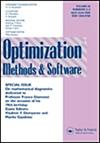The BPMPD interior point solver for convex quadratic problems
IF 1.4
3区 数学
Q3 COMPUTER SCIENCE, SOFTWARE ENGINEERING
引用次数: 85
Abstract
The paper describes the convex quadratic solver BPMPD Version 2.21. The solver is based on the infeasible–primal–dual algorithm extended by the predictor–corrector and target–following techniques. The discussion includes topics related to the implemented algorithm and numerical algebra employed. We outline the presolve, scaling and starting point stategies used in BPMPD, and special attention is given for sparsity and stability issues. Computational results are given on a demonstrative set of convex quadratic problems.凸二次问题的BPMPD内点求解器
本文描述了凸二次解算器BPMPD Version 2.21。该求解器基于基于预测校正和目标跟踪技术扩展的不可行原对偶算法。讨论包括与实现算法和所采用的数值代数相关的主题。我们概述了BPMPD中使用的解析、缩放和起点策略,并特别关注了稀疏性和稳定性问题。给出了凸二次问题的一个证明集的计算结果。
本文章由计算机程序翻译,如有差异,请以英文原文为准。
求助全文
约1分钟内获得全文
求助全文
来源期刊

Optimization Methods & Software
工程技术-计算机:软件工程
CiteScore
4.50
自引率
0.00%
发文量
40
审稿时长
7 months
期刊介绍:
Optimization Methods and Software
publishes refereed papers on the latest developments in the theory and realization of optimization methods, with particular emphasis on the interface between software development and algorithm design.
Topics include:
Theory, implementation and performance evaluation of algorithms and computer codes for linear, nonlinear, discrete, stochastic optimization and optimal control. This includes in particular conic, semi-definite, mixed integer, network, non-smooth, multi-objective and global optimization by deterministic or nondeterministic algorithms.
Algorithms and software for complementarity, variational inequalities and equilibrium problems, and also for solving inverse problems, systems of nonlinear equations and the numerical study of parameter dependent operators.
Various aspects of efficient and user-friendly implementations: e.g. automatic differentiation, massively parallel optimization, distributed computing, on-line algorithms, error sensitivity and validity analysis, problem scaling, stopping criteria and symbolic numeric interfaces.
Theoretical studies with clear potential for applications and successful applications of specially adapted optimization methods and software to fields like engineering, machine learning, data mining, economics, finance, biology, or medicine. These submissions should not consist solely of the straightforward use of standard optimization techniques.
 求助内容:
求助内容: 应助结果提醒方式:
应助结果提醒方式:


